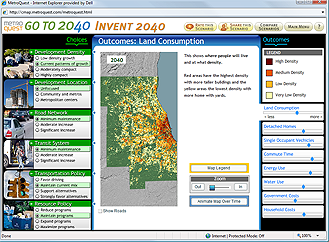One high-schooler noted that walking to work helps the environment, but many suburbs don’t even have sidewalks. And, in winter, not all sidewalks are shoveled.
She suggested a simple solution: Enforce sidewalk shoveling laws.
Another pointed out a lack of cultural awareness and acceptance in the seven-county Chicago region.
Her idea: More geography classes in schools.
A century ago, proponents of the Plan of Chicago boosted public support for its proposals by going into Chicago’s schools and explaining the idea of city planning and the responsibility of all citizens, even children, to think about the future.
After studying in school “Wacker’s Manual of the Plan of Chicago” (named for Chicago Plan Commission chairman Charles Wacker), generations of city residents later voted as adults --- 86 times --- to approve bond issues to pay for civic improvements.
Now, following on this example, the Chicago Metropolitan Agency for Planning (CMAP) has been enlisting high school students in the fight for better regional planning in itsFuture Leaders in Planning program.
“We’re looking for kids who like to speak their mind. Kids who are curious. And kids who are involved in their community,” says CMAP’s Drew Williams-Clark.
The agency’s first class of 40 teens from throughout the seven-county region completed its eight-month program with a presentation before the CMAP board in April. That’s where the ideas for more geography classes and better shoveled sidewalks were suggested, among many others.
Apply by Friday
For information on the program and an application to be in the 2009-2010 group, click here. http://www.cmap.illinois.gov/flip.aspx. Applications are due Friday, June 26, online or postmarked Friday by mail.
“The kids came in with an interest in their communities,” says Williams-Clark.
The goal was to help them see local issues within a regional and global context. “The first hump is always this idea that we are part of a region, and, in terms of the economy, land use and transportation, we need to be thinking as a region,” he says. “These issues aren’t going to be solved by us acting in our own particular communities.”

Mirroring the region’s population, about a third of the first session’s participants were from the collar counties of DuPage, Kane, Kendall, Lake, McHenry and Will Counties. About a third were from suburban Cook County, and a third from Chicago.
In sharing their locally based perspectives, the students “became aware that there are all these different problems and challenges across the region,” says Williams-Clark. They also gained new insights through a role-play exercise in which they took the parts of the many interested parties in a municipal planning question.
Their April presentation reflected the knowledge and understanding of regional issues that they gained through the program.
For instance, one report noted that schools in areas with a high poverty rate are cash-strapped because of the state’s heavy reliance on local property taxes for K-12 education. The recommendation: Greater use of state income tax funds.
Others dealt with such subjects as public housing, the loss of wilderness areas due to highway construction, high speed rail and gentrification.
Borrowing a page from New York
To help longtime residents whose housing costs are skyrocketing because their neighborhoods are under pressure from gentrification, one student proposed borrowing a page from New York City --- the use of rent controls.
The aim of the program is a better informed citizenship in the future. But it had a side benefit as well, according to Williams-Clark.
“There were definitely some kids who left with an interest in planning as a career,” he says.
For a print-friendly version of this post, go here.
Blog Categories
- art (14)
- civic engagement (17)
- culture (16)
- future (26)
- green legacy (15)
- history (26)
- pavilions (4)
- schools (8)
- transportation (7)
